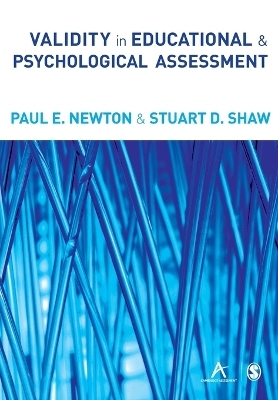
Validity in Educational and Psychological Assessment
SAGE Publications Ltd (Verlag)
978-1-4462-5323-6 (ISBN)
Validity is the hallmark of quality for educational and psychological measurement. But what does quality mean in this context? And to what, exactly, does the concept of validity apply? These apparently innocuous questions parachute the unwary inquirer into a minefield of tricky ideas. This book guides you through this minefield, investigating how the concept of validity has evolved from the nineteenth century to the present day. Communicating complicated concepts straightforwardly, the authors answer questions like:
What does ′validity′ mean?
What does it mean to ′validate′?
How many different kinds of validity are there?
When does validation begin and end?
Is reliability a part of validity, or distinct from it?
This book will be of interest to anyone with a professional or academic interest in evaluating the quality of educational or psychological assessments, measurements and diagnoses.
Paul E. Newton is Professor of Educational Assessment at the Institute of Education, University of London. His research focuses primarily upon issues related to the evaluation of large-scale educational assessment systems, and he is particularly interested in theories of validity for educational and psychological measurement, past and present. He has published on a range of assessment topics, including validity, comparability, assessment purposes, national curriculum test reliability, and the public understanding of measurement inaccuracy. Having obtained a PhD in developmental psychology, Paul moved into educational assessment and has spent most of his career as a researcher within a range of assessment agencies – including the Associated Examining Board, the National Foundation for Educational Research, the Qualifications and Curriculum Authority, Ofqual and Cambridge Assessment. Paul is a member of the Editorial Board of the international journal Assessment in Education: Policy, Principles and Practice and has served on a variety of national and international committees, including the Executive Committee of the International Association for Educational Assessment. He was a member of the Assessment Reform Group, until its retirement in 2010, and is a Fellow of the Association for Educational Assessment – Europe. Stuart D. Shaw is particularly interested in demonstrating how educational, vocational and second language English assessments meet the demands of validity, reliability and fairness. Stuart has a wide range of publications in English second-language assessment and educational research journals. His assessment books include: Examining Writing: Research and practice in assessing second language writing (Shaw and Weir, 2007); The IELTS Writing Assessment Revision Project: Towards a revised rating scale (Shaw and Falvey, 2008); Validity in Educational and Psychological Assessment (Newton and Shaw, 2014); and Language Rich: Insights from multilingual schools (Shaw, Imam and Hughes, 2015). Stuart is a Fellow of the Association for Educational Assessment in Europe (AEA-E) and a Fellow of the Chartered Institute of Educational Assessors (CIEA).
Validity and Validation
The Genesis of Validity: Mid-1800s–1951
The Fragmentation of Validity: 1952–1974
The (Re)Unification of Validity: 1975–1999
The Deconstruction of Validity: 2000–2012
Twenty-first-century Evaluation
| Erscheint lt. Verlag | 15.4.2014 |
|---|---|
| Verlagsort | London |
| Sprache | englisch |
| Maße | 170 x 242 mm |
| Gewicht | 500 g |
| Themenwelt | Geisteswissenschaften ► Psychologie ► Test in der Psychologie |
| Sozialwissenschaften ► Pädagogik | |
| ISBN-10 | 1-4462-5323-6 / 1446253236 |
| ISBN-13 | 978-1-4462-5323-6 / 9781446253236 |
| Zustand | Neuware |
| Haben Sie eine Frage zum Produkt? |
aus dem Bereich


